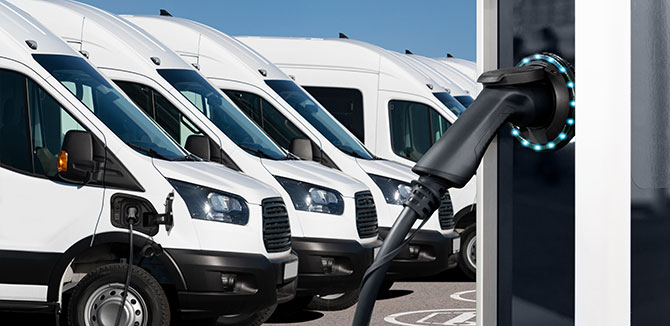Building Beneficial Electrification
Mark Gooden (BA ‘20, MSES ‘21) leans on his MSES lessons to create sensible electric-vehicle conversion programs.

ICF is a global advisory and technology services provider that aims to make big things possible. It’s a message that matters to Mark Gooden (BA ‘20, MSES ‘21).
Gooden joined the company as an associate program manager in March 2024. His goal is to implement beneficial electrification programs in vehicles for utility providers and Fortune 500 companies.
Beneficial electrification – also called strategic electrification – is a term for replacing fossil-fuel use with electricity in a way that reduces overall emissions and energy costs economy-wide while not harming the utility’s bottom-line.
That process can be challenging, as rental car company Hertz learned the hard way.
In October 2021, Hertz announced it would purchase 100,000 Tesla vehicles and planned to buy 240,000 more from General Motors and Polestar over five years.
Less than three years later, hampered by the changing economics of the electric vehicle industry and myriad other problems, Hertz reversed course, selling the bulk of its already-purchased EVs at a steep discount and firing its CEO.
In his current position, Gooden relies on lessons learned in Northwestern's Master of Science in Energy and Sustainability (MSES) program. MSES is jointly offered by Northwestern Engineering and the Paula M. Trienens Institute for Sustainability and Energy.
Gooden’s role is to help entities plan and develop transition programs that make economic and environmental sense. In his eyes, the only way to create sustainable change is by developing solutions that benefit consumers, utility companies, and the environment alike.
“The biggest thing is building a more resilient world for all,” Gooden said. “We are doing consulting and strategic advisory, but we're keeping equity and impact at the core of that message.”
Clarence "Lucky" Lester, a former Tuskegee Airman, founded ICF — then known as Inner City Fund — in 1969 to finance minority-owned businesses in Washington, D.C. Since then, it has evolved into a firm that advocates for responsible strategy and policy in a wide variety of areas – from public health to economic development and energy.
Gooden learned to be comfortable with that variety while in MSES. He was disciplined with his coursework and audited any additional classes that were of interest or would better prepare him to succeed professionally. He completed his project practicum with a digital automation and energy management company. He also worked with a local school district to research and plan to purchase an electric school bus — the first in the United States for a Headstart program.
Gooden credited the program's curriculum and its faculty for preparing him to understand and talk about an array of interconnected sustainability topics — from electrification to hydrogen conversion to environmental justice.
He got the most out of the program because of his commitment to be aggressive in learning as much as possible, he said.
“You’re in the program to learn,” he said. “Yes, the credentials are nice, the networking is nice, but when you get into the program, the best thing that you can possibly do is be aggressive about learning.”
Gooden is familiar with aggressive dedication to a goal. He was a defensive end on Northwestern's football team as an undergraduate while also pursuing a bachelor's degree in environmental sciences. He took that focused mentality with him after graduation, spending nearly three years at Edison Energy as a transportation electrification analyst and senior analyst before taking his current role.
Now he's focused on continuing to make big things possible — one electric vehicle at a time.
"We have an abundance of technology to meet our energy and operational demands, but if we keep consuming at the same rate, we are creating problems for the future of our planet," Gooden said. "As energy professionals, we must plan for the needs of today without compromising the needs of tomorrow."